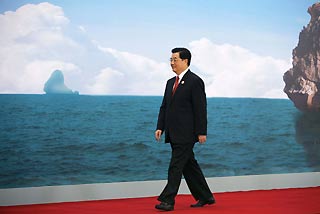President Hu meets with Japanese PM Abe
By Sun Shangwu (Chinadaily.com.cn)Updated: 2006-11-18 20:07 HANOI: China and Japan agreed to expand their warming bilateral relations by keeping high-level contacts and increasing co-operation in energy and economic and trade sectors.
 China's President Hu Jintao arrives at the National Convention Centre for the Asia-Pacific Economic Cooperation (APEC) Summit in Hanoi November 18, 2006. [Reuters]  |
The meeting between Hu and Abe is their second since Abe took office in September. Abe visited Beijing in early October.
Hu said that the meeting reflects the "common will of the two countries to improve bilateral relations" and signals the new beginning.
The two countries agreed to build a "strategic relationship of mutual interests" and foreign affairs departments will work on details of such relationship.
Hu called for more cultural and youth exchanges to increase friendliness between the two peoples so as to consolidate the foundation for bilateral ties.
The Chinese President advocated for drafting middle and long-term planning for bilateral co-operation in sectors of trade, investment, information, energy, environmental protection and finance.
Abe suggested to start the ministerial-level meeting for economic and trade co-operation as well as the dialogues between energy departments of the two countries to increase their partnership in energy-saving and environmental protection.
"President Hu adopts very positive attitudes towards Abe's proposal and believes it is very helpful," said Foreign Ministry spokesman Liu Jianchao after the meeting.
The two leaders also agreed to make joint efforts to promote peace, stability and development in the Northeast Asia and increase coordination in pushing the integration in the region.
During the East Asia Summit, which will be held in the Philippines next month, China, Japan and Republic of Korea should increase trilateral co-operation to promote partnership in investment, environmental protection and tourism, according to Abe.
Hu cited the questions of history and Taiwan as "sensitive questions" concerning political basis for bilateral ties and called for "appropriate handling" of them.
Abe noted that Japan will handle the question of Taiwan according to the joint statement of the two sides, adhering the one-China policy and opposing Taiwan independence.
The two foreign ministers announced on Thursday that the two countries will start the joint research on historical issues, a step believed to be good for reducing disputes on historical issues.
The repeated visits of Abe's predecessor Junichiro Koizumi to the Yasukuni war shrine had soured bilateral relations. Yasukuni, where Class A war criminals are honoured alongside war dead, is seen by many in Asia as a symbol of Japan's aggression in Asia before and during World War II.
The shrine was not mentioned at Saturday's talks, according to Japanese officials.
Both Hu and Abe expressed the willingness to advance negotiations on the East China Sea and make it as the area of "peace, friendship and co-operation."
The two sides have the long-running row over development of natural resources around a disputed area of the East China Sea. Hu said that they should resort to negotiations and talks, put aside disputes and seek common development.
During the meeting, Abe again extended invitation to Hu to visit Japan next
year, and Hu accepted the invitation, according to spokesman Liu, noting the
arrangements will be made through diplomatic channel.
| 1 | 2 |  |
| ||
|
||
|
||
|
|